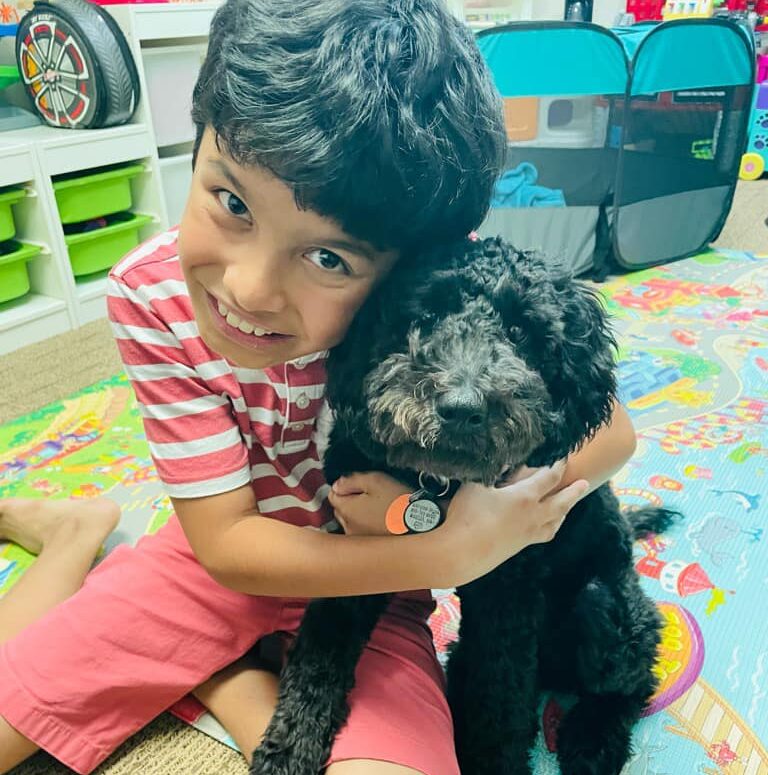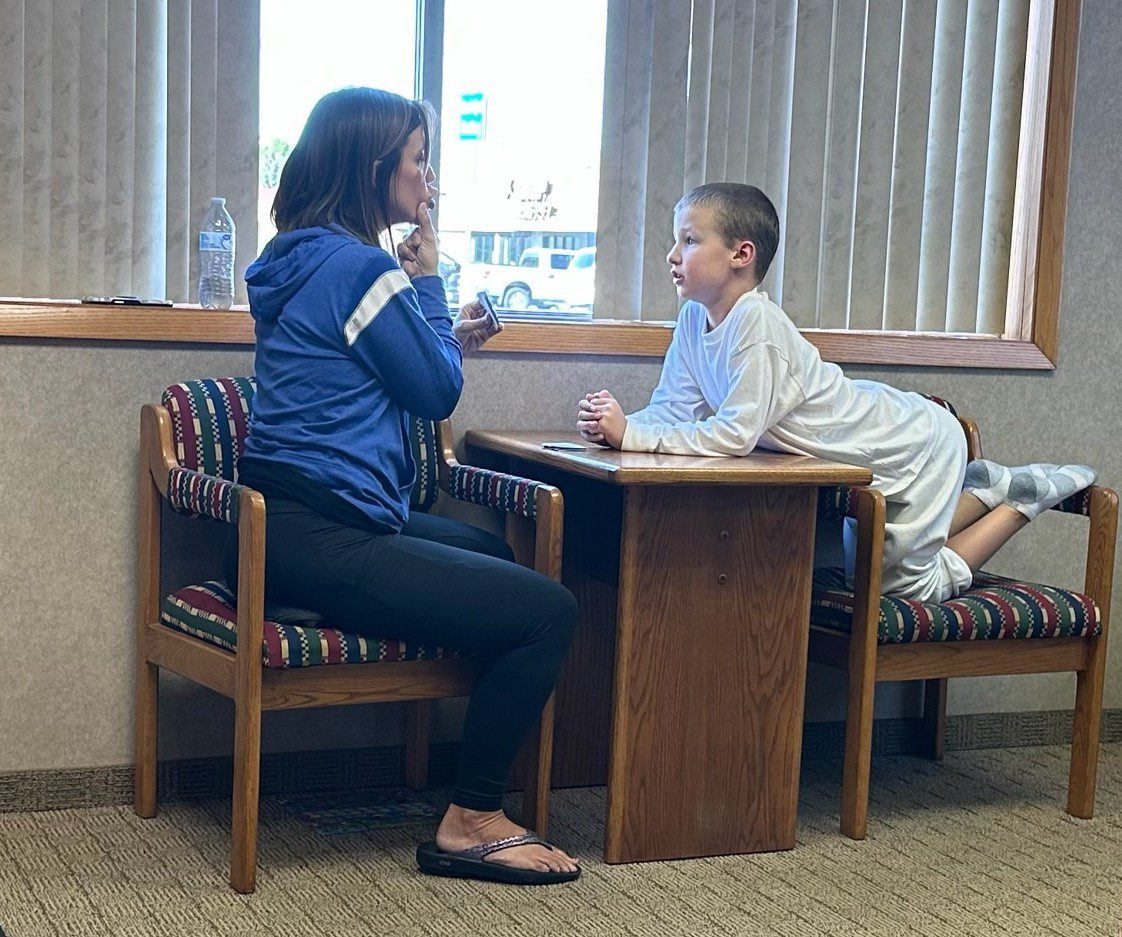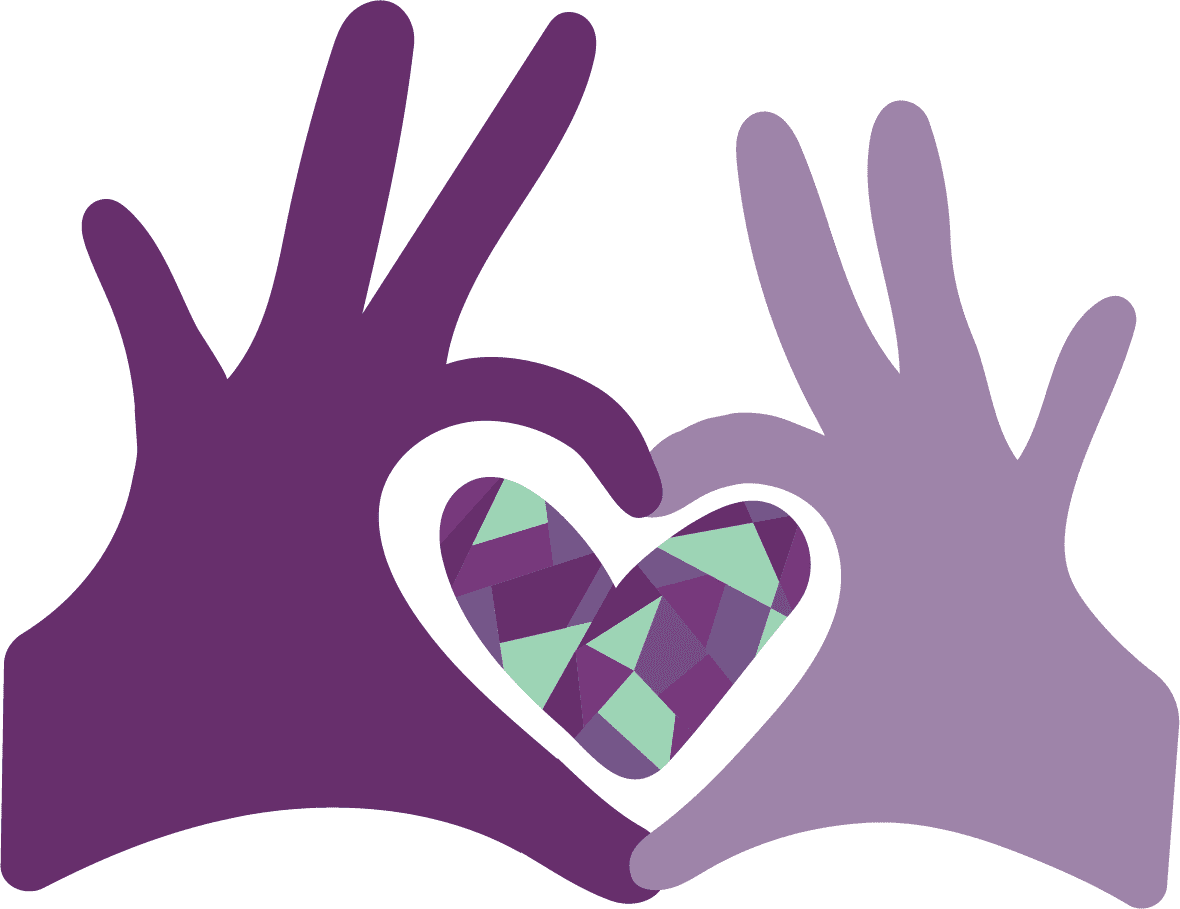Speech and Language Therapy Services
WITH Therapy Services »What is speech and language therapy?
Speech language therapy helps individuals develop the skills needed to effectively communicate with others. This includes speaking clearly, understanding and processing verbal and written messages, effectively expressing thoughts and feelings, and building and maintaining social relationships with others. Speech Language Pathologists work with individuals of all ages and provide support to family members and caregivers to promote achievement in all areas of life.
A list of common, but not exclusive, Medical Diagnoses that speech/language therapy can assist with include:
- Autism Spectrum Disorder
- Down Syndrome
- Cerebral Palsy
- Developmental Delay
- Cleft Lip/Palate
- Hearing Impairments
- Selective Mutism
- Dyslexia
- Central Auditory Processing Disorder
- ADHD/ADD
- Traumatic Brain Injury
- Stroke/CVA
- Multiple Sclerosis
- ALS
- Parkinson’s Disease
- Dementia/Alzheimers
Literacy and Reading
Our speech and language therapy can help get a better understanding of a word’s sound structure and assist with pre-reading and reading skills such as phonemic awareness and spelling.
Our owner and seasoned speech-language pathologist, Ms. Kenda, is Orton-Gillingham-trained. Orton-Gillingham is a research-based teaching approach focusing on reading, spelling, and phonological processing. Its key components include:
- Multisensory: Focuses on linking the major pathways to the brain—visual (sight), auditory (sound), and kinesthetic (touch).
- Sequential: Concepts are taught in a logical, well-planned sequence.
- Incremental and Cumulative: Skills continue to build upon one another with consistent review and reinforcement of previously learned skills.
- Structured: Concepts are taught in a consistent way using predictable routines.
- Individualized: Children’s unique needs are met, and areas of strength are utilized.
- Systematic Phonics: Teaching children that letters correspond to specific sounds and that sounds are used to make up words.
- Explicit: Intentional planning and learning using an evidence-based approach.

Speech Sound Disorders
If you have difficulty understanding what your child says or find yourself having to “translate” for others, speech therapy at WITH will benefit you and your child.
Our owner and expert speech-language pathologist, Ms. Kenda, is Orton-Gillingham-trained. Orton-Gillingham is a research-based teaching approach focusing on reading, spelling, and phonological processing. Its key components include:
Speech Sound Disorders
If you have difficulty understanding what your child says or find yourself having to “translate” for others, speech therapy at WITH will benefit you and your child.
Our treatment focuses on helping your child accurately produce specific sounds or sound patterns and improves their overall speech intelligibility.


Receptive/ Expressive Language Disorders
Receptive: Speech and language therapy at WITH helps with tasks such as following directions, answering questions, and identifying and naming common objects in order to process, attend to, and understand spoken language.
Expressive: Speech and language therapy at WITH can help work on areas such as increasing the number of words used, ensuring proper sequencing of information, and using accurate grammar and sentence structure to communicate with others effectively.

Social/Pragmatic Language Disorders
Speech and language therapy at WITH benefits those who have a hard time in social situations, which could include things such as effectively holding conversations, playing with others, working as part of a team, making predictions about what others are thinking and feeling, problem-solving, self-advocating, understanding humor, sharing space with others, seeing themselves in the eyes of others, etc.
WITH can help you understand the unwritten social rules of different situations we may encounter, assist in connecting with others, and foster quality relationships throughout life.
Social/ Pragmatic Language Disorders
Speech and language therapy at WITH benefits those who have a hard time in social situations, which could include things such as effectively holding conversations, playing with others, working as part of a team, making predictions about what others are thinking and feeling, problem-solving, self-advocating, understanding humor, sharing space with others, seeing themselves in the eyes of others, etc.
WITH can help you understand the unwritten social rules of different situations we may encounter, assist in connecting with others, and foster quality relationships throughout life.


Stuttering
If you or your loved one stutters, speech and language therapy at WITH can teach you strategies to decrease tension, increase fluency, enhance speech clarity, and address any fear or anxiety triggered when talking with others at work, school, and other social settings.

Apraxia
Apraxia of speech (also known as verbal apraxia or childhood apraxia of speech) is a motor speech disorder that affects an individual’s ability to coordinate muscle and muscle group movements. It may also impact the planning and sequencing of speech.
In speech therapy sessions at WITH, we utilize motor planning techniques and incorporate functional words and phrases to help individuals with apraxia improve their speech clarity and communication skills.
Apraxia
Apraxia of speech (also known as verbal apraxia or childhood apraxia of speech) is a motor speech disorder that affects an individual’s ability to coordinate muscle and muscle group movements. It may also impact the planning and sequencing of speech.
In speech therapy sessions at WITH, we utilize motor planning techniques and incorporate functional words and phrases to help individuals with apraxia improve their speech clarity and communication skills.


Alternative and Augmentative Communication (AAC)
Augmentative and Alternative Communication (AAC) encompasses all forms of communication apart from verbal language, including gestures, signs, writing, drawing, or pointing to pictures or words.
At WITH, we work with individuals and families to determine if augmentative or alternative communication is needed. If yes, we find the method and type of AAC that best meets the individual’s needs. We also work with families and caregivers to become familiar with and comfortable using AAC in daily activities and routines.

Aphasia
If you or someone you care about has aphasia, speaking or understanding language may be difficult. Aphasia, often caused by a stroke, can also affect an individual’s reading and writing skills.
At WITH, we assist individuals with aphasia in building their confidence in communication at every level.
Aphasia
If you or someone you care about has aphasia, speaking or understanding language may be difficult. Aphasia, often caused by a stroke, can also affect an individual’s reading and writing skills.
At WITH, we assist individuals with aphasia in building their confidence in communication at every level.


Traumatic Brain Injury (TBI)
TBI can cause individuals to have difficulties with cognitive functions, including speech, language, reading, visual neglect, short and long-term memory, attention, planning, problem-solving, word finding, and social communication.
Speech and language therapy at WITH is designed to benefit an individual dealing with the effects of a TBI and provide caregivers with resources to assist with effective overall communication.

Executive Functioning
Difficulties with executive functioning can result from brain damage or injuries, degenerative brain diseases, genetic disorders, and medications, to name a few causes.
Speech and language therapy at WITH is designed to improve impulse control, flexible thinking, memory, planning and time management, organization, and task initiation.
Executive Functioning
Difficulties with executive functioning can result from brain damage or injuries, degenerative brain diseases, genetic disorders, and medications, to name a few causes.
Speech and language therapy at WITH is designed to improve impulse control, flexible thinking, memory, planning and time management, organization, and task initiation.


Dementia
Skilled speech services benefit individuals diagnosed with dementia or experiencing memory loss. Dementia is often accompanied by symptoms such as distraction, forgetfulness, confusion, difficulty setting goals and plans, trouble following conversations, and difficulty communicating needs and wants to others.
At WITH, our services focus on promoting independence, improving quality of life, and offering support for family members and caregivers.

Dysarthria
Dysarthria is a motor speech disorder that affects the muscles involved in speech production, resulting in damage, paralysis, or weakness. Dysarthria can result in difficult-to-understand speech, either too slow or too fast or robotic and monotone.
At WITH, we offer individualized care and work with families and friends to teach them effective communication methods to better converse with and understand their loved ones.
Dysarthria
Dysarthria is a motor speech disorder that affects the muscles involved in speech production, resulting in damage, paralysis, or weakness. Dysarthria can result in difficult-to-understand speech, either too slow or too fast or robotic and monotone.
At WITH, we offer individualized care and work with families and friends to teach them effective communication methods to better converse with and understand their loved ones.

